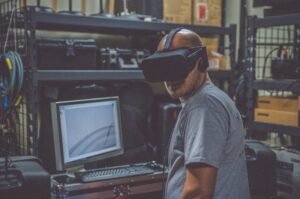Artificial Intelligence Kya Hai
Artificial Intelligence (AI) is a branch of computer science that focuses on creating intelligent machines capable of performing tasks that typically require human intelligence.
Key Takeaways:
- AI is a branch of computer science that aims to create intelligent machines.
- AI can perform tasks that typically require human intelligence.
- It involves various techniques such as machine learning, natural language processing, and computer vision.
The field of AI has grown rapidly in recent years, with advancements in machine learning, data analytics, and computational power. AI systems can now learn from data, recognize patterns, and make decisions with minimal human intervention.
AI encompasses a wide range of applications, from virtual assistants like Siri and Alexa to self-driving cars. It is used in industries such as healthcare, finance, manufacturing, and entertainment to enhance efficiency and improve decision-making processes.
Machine Learning
Machine learning is a subset of AI that focuses on enabling machines to learn from data without being explicitly programmed. It uses algorithms to analyze large datasets and identify patterns, enabling the system to make predictions or take actions based on the observed patterns.
- Machine learning enables machines to learn from data without explicit programming.
- It uses algorithms to analyze large datasets and identify patterns.
- Machine learning can be supervised, unsupervised, or semi-supervised.
Natural Language Processing
Natural Language Processing (NLP) is a branch of AI that focuses on the interaction between computers and human language. It involves teaching computers to understand, interpret, and generate human language, allowing them to communicate with humans in a natural and meaningful way.
- NLP involves teaching computers to understand and generate human language.
- It enables machines to interact with humans in a natural and meaningful way.
Computer Vision
Computer vision is an AI technology that enables machines to interpret and understand visual information from images or videos. It involves techniques that allow computers to extract features from visual data, recognize objects or patterns, and make decisions based on the analyzed information.
- Computer vision enables machines to interpret visual information.
- It involves extracting features, recognizing objects or patterns, and making decisions based on visual data.
| Application | Examples |
|---|---|
| Virtual Assistants | Siri, Alexa, Google Assistant |
| Self-Driving Cars | Tesla Autopilot, Waymo |
| Healthcare | Diagnostic systems, personalized medicine |
The potential applications of AI are vast and continue to expand as technology advances. From healthcare to finance, manufacturing to entertainment, AI is revolutionizing industries across the globe. With its ability to process and analyze data at unprecedented speeds, AI is poised to transform the way we live and work.
- AI has vast applications in various industries, including healthcare, finance, manufacturing, and entertainment.
- It has the potential to revolutionize industries and transform the way we live and work.
| Industry | Examples |
|---|---|
| Healthcare | Medical diagnosis, drug discovery |
| Finance | Automated trading, fraud detection |
| Manufacturing | Process optimization, predictive maintenance |
In conclusion, Artificial Intelligence (AI) is a rapidly evolving field that focuses on creating intelligent machines capable of performing tasks that typically require human intelligence. With advancements in machine learning, data analytics, and computational power, AI systems have become increasingly powerful. Their applications span various industries and have the potential to revolutionize the way we live and work.

Common Misconceptions
Artificial Intelligence is the Same as Human Intelligence
One common misconception about artificial intelligence (AI) is that it is the same as human intelligence. However, AI refers to the development of machines or computer systems capable of performing tasks that typically require human intelligence. It does not possess emotions, consciousness, or self-awareness like humans do.
- AI does not have emotions or consciousness.
- AI lacks the ability to possess human-like self-awareness.
- AI cannot replicate the full range of human intelligence.
AI Will Replace All Human Jobs
Another misconception is that AI will entirely replace human jobs. While AI has the potential to automate certain tasks and improve efficiency, it is unlikely to replace all jobs. AI technology is designed to enhance human capabilities, augmenting tasks and freeing up time for more complex and creative work.
- AI technology is designed to enhance human capabilities, not replace them.
- AI will likely automate some tasks, but not full job roles.
- AI can create new job opportunities in industries such as robotics and machine learning.
AI is a Perfect Solution
Some people believe that AI can solve all problems perfectly. However, AI systems are not infallible and can make mistakes. They are designed based on algorithms and data, which can lead to biases, errors, or misinterpretations if not properly trained or programmed.
- AI systems can make mistakes and errors.
- Biases can be present in AI systems due to the data used to train them.
- Just like any technology, AI has limitations and is not a perfect solution.
AI is Dangerous and Will Take Over the World
There is a misconception that AI is dangerous and will take over the world. While it is important to consider the ethical implications and potential risks of AI, the idea of AI becoming superintelligent and threatening humanity like in science fiction movies is currently far from reality.
- AI does not have the capability to take over the world or harm humanity.
- The development and deployment of AI are guided by ethical considerations and regulations.
- AI’s primary purpose is to assist humans and provide benefits, not pose a threat.
AI Can Think and Learn Like Humans
Lastly, there is a common misconception that AI can think and learn like humans. While AI can learn from patterns and data, it does not possess the same type of consciousness or thought process as humans. AI learns through algorithms and statistical analysis, whereas human intelligence involves complex cognitive processes.
- AI learns through algorithms and statistical analysis, not through intuition or human-like cognition.
- Human intelligence involves emotions, creativity, and abstract thinking that AI does not possess.
- AI’s learning capabilities are limited to the data it is trained on.

What is Artificial Intelligence?
Artificial Intelligence (AI) is a branch of computer science that focuses on creating intelligent machines capable of performing tasks that typically require human intelligence. With advancements in technology, AI has become a vital part of various industries, improving efficiency, accuracy, and decision-making capabilities. Below are ten interesting pieces of information that highlight the impact and potential of AI in different domains.
1. AI in Healthcare: Revolutionizing Medical Diagnoses
In the field of healthcare, AI plays a significant role in transforming medical diagnoses. By analyzing vast amounts of data, AI systems can detect health conditions, such as cancer, with incredible accuracy. In fact, AI-powered diagnostic tools have shown to achieve recognition rates exceeding 90%, surpassing human capabilities.
2. AI in Gaming: Enhancing Player Experience
Artificial Intelligence has greatly influenced the gaming industry by creating intelligent opponents, realistic virtual worlds, and adaptive gameplay. AI algorithms also enable game characters to learn and evolve, offering unique and challenging experiences for players. This technological advancement results in more immersive and engaging gaming environments.
3. AI in Finance: Optimizing Fraud Detection
Financial institutions extensively use AI algorithms to detect fraudulent transactions and prevent financial crimes. AI systems analyze patterns, detect anomalies, and raise alerts, ensuring faster identification and prevention of fraudulent activities. This leads to enhanced security and customer confidence in financial services.
4. AI in Education: Personalized Learning Experience
AI technologies offer personalized learning experiences for students. Intelligent tutoring systems adapt to each student’s strengths and weaknesses, providing tailored guidance and support. These systems track progress, offer feedback, and recommend personalized study plans, complementing traditional teaching methods and enhancing educational outcomes.
5. AI in Agriculture: Precision Farming
AI revolutionizes the agriculture sector through precision farming techniques. By utilizing sensors, drones, and AI algorithms, farmers can optimize crop yields, detect diseases, and reduce the use of pesticides and water. This leads to higher productivity, sustainability, and overall cost savings in agricultural practices.
6. AI in Transportation: Autonomous Vehicles
The development of self-driving cars and autonomous vehicles relies heavily on AI technology. With AI algorithms, these vehicles analyze real-time data, navigate routes, detect obstacles, and make decisions to ensure passenger safety. The emergence of autonomous vehicles has the potential to transform transportation, improving efficiency and reducing accidents.
7. AI in Retail: Enhancing Customer Experience
AI revolutionizes the retail industry by enhancing the customer experience through personalized recommendations, virtual shopping assistants, and chatbots. AI-powered systems analyze customer preferences, buying behavior, and product data to provide tailored suggestions, resulting in improved customer engagement and satisfaction.
8. AI in Entertainment: Content Creation
Artificial Intelligence plays a crucial role in content creation for various forms of media. AI algorithms can generate personalized music playlists, suggest movies based on viewing history, and even create original artworks. These AI-generated content recommendations enhance entertainment experiences and cater to individual preferences.
9. AI in Manufacturing: Streamlining Production Processes
Integrating AI into the manufacturing sector improves production efficiency, quality control, and predictive maintenance. Robots equipped with AI systems can perform repetitive and complex tasks with precision, reducing error rates and overall production time. Implementation of AI in manufacturing leads to higher productivity and cost savings.
10. AI in Cybersecurity: Proactive Threat Detection
AI helps in combating cybersecurity threats by proactively detecting and mitigating potential attacks. AI systems analyze network patterns and user behavior to identify anomalies and suspicious activities, enabling swift detection and response to security breaches. AI-powered cybersecurity measures ensure improved protection of sensitive data.
In summary, Artificial Intelligence encompasses a diverse range of applications across several industries. This technology revolutionizes various sectors, from healthcare and finance to gaming and transportation, by improving efficiency, personalizing experiences, and enhancing decision-making capabilities. With ongoing advancements, the potential for AI to shape and benefit society in remarkable ways is boundless.
Frequently Asked Questions
What is Artificial Intelligence?
What is artificial intelligence (AI)?
How does Artificial Intelligence work?
How does AI work?
What are the different types of Artificial Intelligence?
What are the types of AI?
What are the applications of Artificial Intelligence?
What are the applications of AI?
What are the advantages of Artificial Intelligence?
What are the advantages of AI?
Are there any risks associated with Artificial Intelligence?
Are there any risks with AI?
Can Artificial Intelligence replace humans?
Can AI replace humans?
Is Artificial Intelligence the same as Machine Learning?
Is AI the same as Machine Learning?
How is Artificial Intelligence impacting various industries?
How does AI impact industries?
What is the future of Artificial Intelligence?
What is the future of AI?




